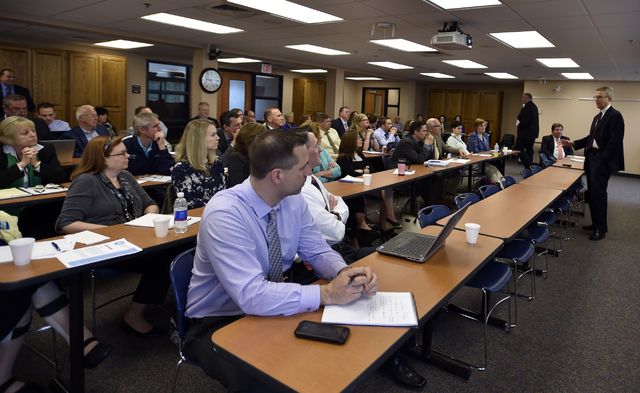Click here to subscribe today or Login.
KINGSTON — David Volkman likes to joke about surviving five years in the state Department of Education while holding four different jobs. “I just keep moving around the building so nobody can find me to fire me,” he quipped.
His longevity likely proved helpful Wednesday as Volkman, currently executive deputy secretary of education, tried to help area educators prepare for the big, if still unclear changes in store as the new federal Every Student Succeeds Act kicks in in 2017.
ESSA replaces the 2001 No Child Left Behind law, famous — or infamous — for ushering in an era of high-stakes testing and mandated proficiency goals. Critics long argued NCLB was an unfunded mandate that encouraged “teaching to the test” and even cheating as schools worked toward 100-percent proficiency in reading and math tests.
The new law “gives us the greatest flexibility we’ve had since 2001,” Volkman said during his visit at the Luzerne Intermediate Unit. “This really is a sea change.”
Some highlights:
• The old law required all public school students to score proficient or better by 2014 on math and English Language Arts (reading) tests. The new law lets “states identify specific goals,” as long as proficiency is addressed.
• ESSA requires 95-percent participation in the mandated tests, something Volkman was skeptical could be attained at a time more and more parents “opt out,” with religious objections being the most frequently used legal reason. “I found people in Pennsylvania becoming extremely religious in recent years,” Volkman said, evoking laughs.
• A scant 1 percent of special education students may take an alternate assessment. The remainder must take the regular standardized tests.
• “English Language Learners” — a term already modified from the old “English as Second Language” — will become even more terse (and arguably less redundant). “They are English Learners now,” Volkman said. Their progress must be measured, but a new student transferring into a district will not be counted in any assessment for one year.
• Proficiency must still be measured, but will have less emphasis when a school’s success is judged. The state can also include metrics such as “school climate, post-secondary readiness and student engagement.” And the law bars the federal department of education from mandating any specific metrics beyond test scores.
• Once the state devises a system for grading school success, the law requires the state to provide assistance and intervention for the schools that score in bottom 5 percent of that new system.
“The question is, how many years can a school be in that list? Volkman said. “When are they deemed out of it? What are the annual objective measures? Nobody knows.”
The flexibility means the state can tailor a system that could reduce the time committed to testing, and may be able to funnel more federal money toward teacher development. While it could take several years, it also means the current “School Performance Profile” grading system can get revamped, as well as the new teacher evaluation system.
There is one other big change: The state is making an extensive effort to get input from “stakeholders” as the system is devised. Volkman said the plan is to have a preliminary system ready by the end of this year, at which time it will be available for 30 days for public comment followed by more revisions, with the final plan done that summer or fall.
But there’s a risk, Volkman said.
“With all that latitude, I get a little concerned about doing these things with fidelity.”





